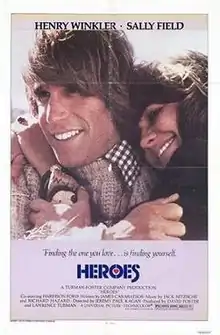Heroes (1977 film)
Heroes is a 1977 American drama film directed by Jeremy Paul Kagan[3] and starring Henry Winkler, Sally Field and Harrison Ford (in his first post-Star Wars role, but filmed before that movie's release).
| Heroes | |
|---|---|
 Theatrical release poster | |
| Directed by | Jeremy Paul Kagan |
| Produced by | David Foster Lawrence Turman |
| Written by | James Carabatsos |
| Starring | Henry Winkler Sally Field Harrison Ford Val Avery |
| Music by | Jack Nitzsche |
| Cinematography | Frank Stanley |
| Edited by | Patrick Kennedy |
| Distributed by | Universal Pictures |
Release date |
|
Running time | 112 minutes |
| Country | United States |
| Language | English |
| Budget | $3.1 million[1] |
| Box office | $33.5 million[2] |
Winkler plays a Vietnam War veteran with PTSD who sets about finding the men from his unit that had served in Vietnam. Field plays his at-first-reluctant girlfriend and Ford plays one of the former soldiers in his unit, now a dysfunctional stock car driver in Sedalia, Missouri, who keeps a stolen M16 rifle in the trunk of his car.
Plot
Jack Dunne (Winkler), an amnesiac Vietnam veteran most likely suffering from a severe case of PTSD , escapes a mental ward in New York City intent on starting a business as a worm farmer in Eureka, California.
At the bus station, he accidentally meets Carol Bell (Field), a woman unsure of her engagement to a man towards whom she has confused feelings. Initially annoyed by Jack, Carol gradually warms to him as they set off on a trip through middle America towards Northern California: during the journey she has time to reflect on her impending nuptials as Jack tries to locate his three war buddies hoping to enlist them in his dream to start a worm farm.
It becomes clear that the first two friends Jack and Carol locate are in too poor condition to do much work of any kind. When a visit to the parents of the third results in the disclosure that the friend had died in the war, Jack, who knew as much but was in denial, relives the battlefield trauma of his buddy's death. Finally, Carol's compassion and caring enable Jack to come to terms with reality.
Cast
- Henry Winkler as Jack Dunne
- Sally Field as Carol Bell
- Harrison Ford as Ken Boyd
- Val Avery as Bus Driver
- Olivia Cole as Jane Adcox
- Hector Elias as Dr. Elias
- Dennis Burkley as Gus
- Tony Burton as Chef
- Michael Cavanaugh as Peanuts
- Stuart Margolin (uncredited) Station Wagon Driver
Production
The film was based on an original autobiographical script by James Carabatsos, a Vietnam veteran who also wrote such military-themed films as Heartbreak Ridge and Hamburger Hill. He sent it to the agent of Henry Winkler, then hugely popular because of Happy Days. Winkler loved the script and showed it to two producers, Lawrence Turman and David Foster, who wanted to work with him. They presented it as a package to Ned Tanen at Universal who agreed to finance the movie.[4] David Freeman did a rewrite of the film which was shot over 35 days.[5]
Reception
The film was difficult to sell owing to its subject matter and the fact Winkler was playing a character so different from the Fonz.[6]
Critical response
The movie received a mixed reception. Roger Ebert gave the movie 3 stars out of a possible 4.
Vincent Canby was far more negative, calling it "excruciatingly obvious" and "frighteningly bad", with "all of the magic of commercial television except canned laughter."[7]
On Metacritic the film has a weighted average score of 35 out of 100, based on 7 critics, indicating "generally unfavorable reviews".[8]
When the movie was released on VHS/DVD, the ending song, "Carry On Wayward Son" by Kansas - their first Top 20 hit - was replaced by an instrumental song, as the rights to the song had not been obtained. This greatly diminished the emotional impact of the final scene. However, most TV airings still contain the original soundtrack, and, in fact, the inclusion of the Kansas song has allowed "Carry On Wayward Son" to remain popular since its release, being certified Gold in 1990, and frequently still heard on the radio.
Box office
The movie was a box office success, grossing $33.5 million on a $3.1 million budget, and opened at number 1 at the U.S. box office.
Accolades
Henry Winkler received a Golden Globe award nomination for Best Actor in a Drama film.[9] He also received the corresponding BAFTA nomination. It received another BAFTA nomination, for Best Musical Score.[10][11]
References
- "Once 'Secondary' Income Now 'Primary' In Production". Variety. May 31, 1978. p. 4.
- "Heroes, Box Office Information". Box Office Mojo. Retrieved January 29, 2012.
- "Heroes". TCM database. Turner Classic Movies. Retrieved February 27, 2016.
- MOVIE CALL SHEET: Aaaayyy! New Role for the Fonz Kilday, Gregg. Los Angeles Times 21 July 1976: g10.
- Winkler Out of Fonz Furrow Kilday, Gregg. Los Angeles Times 13 Apr 1977: f14.
- A Campaign for 'Heroes:' The Evolution of an Ad Wilson, John M. Los Angeles Times 16 Oct 1977: t40.
- 'Heroes,' Excruciatingly Obvious Film, by Vincent Canby, in The New York Times; published November 5, 1977
- "Heroes (1977) reviews". Metacritic. Retrieved August 28, 2020.
- https://www.goldenglobes.com/person/henry-winkler
- "HEROES: Fearless Fonz". Time. November 21, 1977. Retrieved 2010-09-01. (subscription required)
- Canby, Vincent (1977-11-05). "Movie Review - Heroes - 'Heroes,' Excruciatingly Obvious Film - NYTimes.com". Movies.nytimes.com. Retrieved 2012-07-05.
External links
- Heroes at IMDb
- Heroes at Rotten Tomatoes
- Heroes at the TCM Movie Database